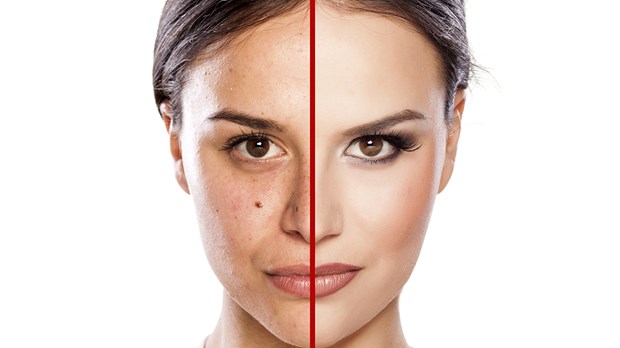
Dove recently posted a powerful video that explores the connection between the body image of mothers and daughters. They found that girls typically view their bodies similarly to the way they perceive their mothers to view their own bodies. “The thing is, children are so savvy. They pick up on body language, facial nuances, inflection, and they overhear conversations not meant for their sweet little ears,” one woman observed. Children pick up the littlest things they see and hear—and little girls aren’t the only ones. Adults are actually wired to perceive the same way.
The Subtle Messages
Meeting a friend for coffee, I slide into a seat across the table from her. If I lead with an apology for rushing out of the house without makeup, or announce that I’m having a bad hair day—even when couching it as a playful self-criticism—I’m letting my friend know not only that this is what I value in myself, but I’m inadvertently communicating that it’s what I value in her.
The woman sipping coffee, or the little girl paging through a picture book beside her, is savvy enough to realize that if I’m not acceptable to me, she’s not acceptable to me. And though I’d never dream of suggesting that my friend needs to have camera-ready makeup to appear in public, or that her daughter needs well-coifed hair to be found acceptable to me or others, that is exactly what I’ve just communicated through my self-criticism. Even if my offhanded remark never rises to the level of consciousness in the coffee-drinking woman or the book-reading girl, each intuitively understands how humans work: if I don’t accept myself without reservation or qualification, I can’t accept them.
Like children, we’re all pretty sharp in picking up these subtle messages.
Blossoming into Comfortable
The converse—receiving someone exactly as she is, warts, blemishes, bad hair and all—is the stuff reserved for the woman about whom we say, “She’s comfortable in her own skin.”
Do you know a woman like this? The woman we identify as “comfortable in her skin” might have taut, flawless skin, but she could just as easily have saggy jowls or skin rolling back over itself around her waist. Her hands might be covered in age spots, or she may boast only a few short eyelashes. But what signals to us that she’s comfortable in her skin is that we never hear a single peep from her about the jowls, rolls, spots, or lashes.
Rather, if I’m sitting across from this gracious woman at that same coffee shop, her lashless eyes are fixed on me. Her heart is too. Her aging hands reach over to caress mine when I share something painful. Her jowly jaw affirms me. She certainly gives no indication that she’s even aware of the rolls of fat around her middle. Rather, she embodies Tim Keller’s description of gospel-humility: “The essence of gospel-humility is not thinking more of myself or thinking less of myself, it is thinking of myself less.”
The woman who’s comfortable in her skin loves other women well because, free from self-preoccupation, she makes God’s radical acceptance of others real, as they are and not as the world insists they should be. She embodies the confounding life and witness of Jesus in the ways that she’s with others and for others.
Just a Glance
Savvy, intuitive women and girls can actually discern this quality in a woman with a single glance.
If I’ve paid thousands of dollars for a surgeon to pull my face skin tight, deflate my butt, and inflate my breasts, or if I’m disguised by concealers, inks, bleaches, and dyes, I have—in a moment—communicated to others that there is a degree to which I don’t accept myself just as I am.
Believe me, I hear the offense in the suggestion. I am aware that many will disagree. I have countless makeup-loving friends who insist that we do all that pricey sticky stuff because we like it. But it still begs the question: Why don’t we like being mousy, graying, blotchy, and wrinkled? I suspect it’s because as we inevitably move closer to death, in a society that prizes youth and beauty, we’ve believed the lie that we’re not really acceptable as we are.
And it’s why I think that arriving makeup-free to the coffee shop, grocery store, or church is a radical act of love for one’s self and for others. To do this “weird” thing is to help others live into the most fundamental reality about our identity: God radically accepts us as we are and not as we should be.
Women of all ages are choosing to be brave, to let others see who they really are. By joining them, you can give a good gift to the little girl in every woman who longs to be known, received, and loved exactly as she is.
Margot Starbuck, MDiv, is an award-winning writer and speaker. Connect with Margot on Facebook, Twitter, or at MargotStarbuck.com.
Read more articles that highlight writing by Christian women at ChristianityToday.com/Women
 Read These Next
Read These Next

 I Was RapedCould God heal my deep emotional scars?
I Was RapedCould God heal my deep emotional scars? Why We Must Be Surprised by the HealerGod's ultimate purpose in healing is so we know he is the Lord, our Healer.
Why We Must Be Surprised by the HealerGod's ultimate purpose in healing is so we know he is the Lord, our Healer.
 On a Non-Traditional Path? That's Okay.6 things I'm learning about calling in my first decade of adulthood
On a Non-Traditional Path? That's Okay.6 things I'm learning about calling in my first decade of adulthood








 Homepage
Homepage
